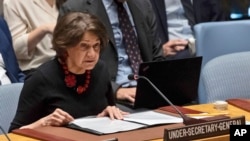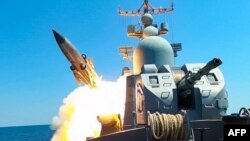Latest developments:
- The British Defense Ministry said Saturday in its daily intelligence report on Ukraine that leading nationalist military blogger Igor Girkin “was almost certainly arrested for extremism” Friday. The ministry said Girkin, a critic of Russia’s Defense Ministry’s “conduct of the war,” has recently engaged in direct criticism of Russian President Vladimir Putin and “his time in power.” The arrest will likely “infuriate” military bloggers, who view Girkin as “an astute military analyst and patriot,” the British ministry said.
- The United States plans to announce as soon as Tuesday a new military aid package for Ukraine of up to $400 million, including artillery, air defense missiles and ground vehicles, as Ukraine’s counteroffensive grinds on, three U.S. officials said Friday. The package will not include cluster munitions.
- Warsaw's Security Committee decided Wednesday to move military units to eastern Poland after members of the Russian Wagner mercenary force arrived in Belarus, the state-run news agency PAP quoted its secretary as saying Friday.
- The World Bank's private investment arm is considering $1.5 billion in investments in Ukraine’s banking, agribusiness and infrastructure sectors, a senior official with the International Finance Corporation said Friday.
- Russian President Vladimir Putin told a meeting of his Security Council in televised remarks that any aggression by Poland against Russia's neighbor and close ally Belarus would be considered an attack on Russia. Poland denies any territorial ambitions in Belarus.
Ukrainian President Volodymyr Zelenskyy said Friday that the Crimea Bridge is a legitimate target.
The bridge that links Crimea to Russia was hit Monday with explosions that killed two people. Following the attack, a portion of the bridge was put out of commission.
Speaking Friday by video link to the Aspen Security Conference in the U.S., Zelenskyy said, “This is the route used to feed the war with ammunition and this is being done on a daily basis. And it militarizes the Crimean peninsula."
Ukraine has not claimed responsibility for the bridge attack. Moscow blames Ukraine.
Zelenskyy said in in his daily address Friday, “Russia killed two more children today. ... A girl born in 2007 and a boy born in 2013 died.”
Zelenskyy said the children were killed in an attack on the village of Druzhba in the Donetsk region. Two women were also killed in the attack, while a cultural center, a school, and residential buildings were damaged.
Also Friday, Zelenskyy held a phone conversation with his Turkish counterpart, Recep Tayyip Erdoğan, on coordinated efforts to restore the operation of the Black Sea Grain Initiative.
Zelenskyy called unblocking the grain corridor an absolute priority. "Due to Russia's actions, the world is once again on the brink of a food crisis," he said. "A total of 400 million people in many countries in Africa and Asia are at risk of starvation. With joint efforts, we must avert the global food crisis."
His remarks were echoed by U.N. political affairs chief Rosemary DiCarlo to the Security Council earlier Friday. She said that Russian attacks on Ukrainian Black Sea ports could have “far-reaching impacts on global food security, in particular in developing countries."
DiCarlo also called threats about the potential targeting of civilian vessels in Black Sea waters — made by both Russia and Ukraine — unacceptable.
"Any risk of conflict spillover as a result of a military incident in the Black Sea, whether intentional or by accident, must be avoided at all costs, as this could result in potentially catastrophic consequences to us all," she said.
Missile strikes
Russian cruise missiles pummeled Ukrainian food export storage facilities in Odesa early Friday. The attacks followed a three-day barrage against the region’s Black Sea port infrastructure.
"Unfortunately, the grain terminals of an agricultural enterprise in Odesa region were hit. The enemy destroyed 100 tons of peas and 20 tons of barley," regional governor Oleh Kiper said on the Telegram messaging app.
Two people were injured, Kiper said, while officials reported seven dead in Russian airstrikes elsewhere in Ukraine.
Moscow has described the attacks as retaliatory after Ukraine’s strike on the Russian-built bridge to Crimea. Russia accuses Ukraine of using the sea corridor to launch terrorist attacks.
“Terrorist attacks are when Russian anti-ship missiles hit shopping malls, hospitals and grain terminals," tweeted Mykhailo Podolyak, a Ukrainian presidential adviser, in response.
Russia said its Black Sea fleet had practiced firing rockets at "floating targets" and it would deem all ships heading for Ukrainian waters to be potentially carrying arms.
Kyiv responded with a similar warning about ships headed to Russia.
Since the grain deal expired Monday, the number of ships loading grain cargoes from the Black Sea area has fallen by 35%. Uncertainty grows over whether Russia could hit commercial traffic, and shipping insurance companies have now suspended coverage for shipments from Ukraine apart from the smaller ports along the Danube, insurance industry sources said Friday.
Ships stalled
Meanwhile, dozens of ships were waiting to pass through the Danube channel Friday, including vessels bound for Romania or leaving from there, according to data from analytics company MarineTraffic.
In an interview with VOA’s Russian Service, USAID Deputy Administrator Isobel Coleman said that the U.S. agency has been assisting Ukraine in exporting grain via alternate routes through Poland and other countries, as well as through the Danube River.
Coleman said these alternate routes are not as “cost-efficient and not as fast as transporting in big bulk carriers from the Black Sea, and it has caused some friction with its neighbors.” Overland Ukrainian grain exports can adversely affect grain prices of Ukraine’s European neighbors, which see their agricultural products depreciate.
But Coleman stressed it is important to utilize these alternate distribution routes so that “Putin's blackmail, his destruction, will not undermine Ukraine's agricultural sector.”
The attacks on Ukraine’s grain export infrastructure and fears about the fate of grain shipping have triggered a spike in the prices of grain products.
Erdogan said Western countries should address Russia’s demands to restore the Black Sea grain corridor.
The U.S. Treasury said Thursday that it had imposed new Russia-related sanctions to "reduce Russia’s revenue from the metals and mining sector, undermine its future energy capabilities and degrade Russia’s access to the international financial system."
Wagner Group
The last of the Wagner Group’s convict-prisoner mercenaries are scheduled to be released from their mandated service “in the coming days,” the British Defense Ministry said Friday.
In the ministry’s daily intelligence report about Russia’s invasion of Ukraine, it said “a significant number” of the pardoned convicts would likely continue with Wagner as professional contractors. Russia now controls Wagner’s prison recruitment pipeline, according to the ministry.
The Wagner Group staged a mutiny against Putin’s authority last month.
The end of the Wagner Group’s prison recruitment program marks one of the bloodiest episodes in modern military history, the British ministry said, with as many as 20,000 convict-recruits killed in a few months.
White House national security adviser Jake Sullivan told the Aspen Security Forum on Friday that Wagner mercenaries were not fighting in Ukraine at present.
Wagner’s chief, Yevgeny Prigozhin, said in a video Wednesday that his fighters would take no further part in the Ukraine war for now, ordering them to gather their strength for Africa.
VOA National Security Correspondent Jeff Seldin, VOA Pentagon Correspondent Carla Babb, VOA White House Correspondent Anita Powell, U.N. Correspondent Margaret Besheer, VOA’s Anna Chernikova in Kyiv, VOA’s Mykhailo Komadovsky contributed to this report. Some information came from The Associated Press, Agence France-Presse and Reuters.







